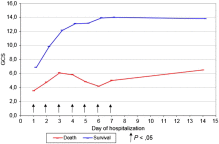Article in Press
Glasgow Coma Scale used as a prognostic factor in unconscious patients following cardiac arrest in prehospital situations: preliminary data
Andrzej Kurowski, PhD, MD
Department of Anesthesiology, Cardinal Wyszynski National Institute of Cardiology, Warsaw, Poland
Łukasz Szarpak

x
, PhD, DPH, EMT-PŁukasz Szarpak
Search for articles by this author
Correspondence
- Corresponding author at: Department of Emergency Medicine, Medical University of Warsaw, Lindleya 4 Str., 02-005, Warsaw, Poland. Tel.: +48 500186225.

x
Łukasz Szarpak
Search for articles by this author
Correspondence
- Corresponding author at: Department of Emergency Medicine, Medical University of Warsaw, Lindleya 4 Str., 02-005, Warsaw, Poland. Tel.: +48 500186225.
Department of Emergency Medicine, Medical University of Warsaw, Warsaw, Poland
Department of Internal Medicine I, Medical University of Vienna, Vienna, Austria
Silvia Samarin, PhD, MD
Department of Cardiology, University Medical Centre Ljubljana, Slovenia
Łukasz Czyzewski, PhD
Department of Nephrologic Nursing, Medical University of Warsaw, Warsaw, Poland
 Article Info
Article Info
Publication History
Published Online: March 29, 2016Accepted: March 23, 2016; Received: March 22, 2016;
To view the full text, please login as a subscribed user or purchase a subscription. Click here to view the full text on ScienceDirect.

Figure
Comparison of mean scores of GCS in the analyzed subgroups.
We read with great interest the article “Early neurologic examination is not reliable for prognostication in post–cardiac arrest patients who undergo therapeutic hypothermia” [1]. Sudden cardiac arrest (SCA) outside the hospital due to heart disease is the most common cause of performing cardiopulmonary resuscitation (CPR). Survival after prehospital cardiac arrest primarily determines factors associated with the prehospital period during the course of resuscitation [2,3]. Studies on the pathomechanism of damage to the central nervous system as a result of cardiac arrest were mainly conducted on animals, and only a few clinical studies of hypoxia in neonates and hypoperfusion of the brain during cardiopulmonary bypass provided insights into underlying pathomechanisms in humans [4].
To access this article, please choose from the options below
Purchase access to this article
Claim Access
If you are a current subscriber with Society Membership or an Account Number, claim your access now.
Subscribe to this title
Purchase a subscription to gain access to this and all other articles in this journal.
Institutional Access
Visit ScienceDirect to see if you have access via your institution.
Source of support: no sources of financial and material support to be declared.
© 2016 Elsevier Inc. Published by Elsevier Inc. All rights reserved.
Access this article on
Visit ScienceDirect to see if you have access via your institution.
Related Articles
Searching for related articles..


